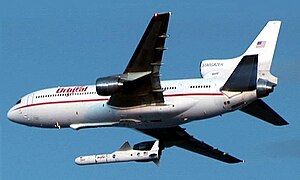Stargazer (aircraft)
| Stargazer | |
|---|---|
 |
|
| Launch of a Pegasus-XL from Stargazer with the ST-5 satellites | |
| Type | Lockheed L-1011 TriStar 500 |
| Registration | registration number N140SC |
| Owners and operators | Orbital ATK |
| Status | Active |
| Launch history | |
| Status | Active |
| Launches | 35 |
| First launch | 27 June 1994 |
| Last launch | 15 December 2016 |
| Associated rockets |
Pegasus-H Pegasus-XL |
Stargazer, registration number N140SC, is a Lockheed L-1011 TriStar built in 1974, that was modified in 1994 to be used by Orbital Sciences (now Orbital ATK) as a mother ship launch pad for Pegasus rockets. As of June 2012[update], 35 rockets have been launched from it, using the Pegasus-H and Pegasus-XL configurations.
The first Pegasus launch to use Stargazer was conducted on 27 June 1994, and was the maiden flight of the Pegasus-XL. Previous launches used the NASA-operated Boeing NB-52B Balls 8, which was also used for four subsequent launches, as the original Pegasus could not be launched from Stargazer due to clearance issues. A modified version, the Pegasus-H, was introduced to rectify this.
In addition to Pegasus launches, Stargazer was used for captive tests and transportation of the X-34 hypersonic research aircraft; however, drop tests used Balls 8. Orbital Sciences also offer the aircraft for research flights. It is capable of carrying a 23,000 kilograms (51,000 lb) payload to an altitude of 12,800 metres (42,000 ft).
Pegasus launches using Stargazer are usually conducted from Vandenberg Air Force Base. However, launches have also been conducted from the Cape Canaveral Air Force Station, the NASA Kennedy Space Center, the NASA Wallops Flight Facility and from launch sites outside the United States: Kwajalein Atoll in the Marshall Islands and Gando Airport in Spain.
...
Wikipedia
